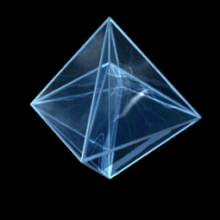cross-polytope
Appearance
English
[edit]
Alternative forms
[edit]Noun
[edit]cross-polytope (plural cross-polytopes)
- (geometry) A polytope that is the convex hull of points, two on each Cartesian axis of a Euclidean space, that are equidistant from the origin; an orthoplex.
- 2006, Ingemar Bengtsson, Karol Zyczkowski, Geometry of Quantum States: An Introduction to Quantum Entanglement, page 25:
- The case p = 1, which is actually important to us, is illustrated in Figure 1.14; we are looking at the intersection of a cross-polytope with the probability simplex.
- 2008, Robert Erdahl, Andrei Ordine, Konstantin Rybnikov, Perfect Delaunay Polytopes and Perfect Quadratic Functions on Lattices, Matthias Beck, et al. (editors), Contemporary Mathematics 452: Integer Points in Polyhedra — Geometry, Number Theory, Representation Theory, Algebra, Optimization, Statistics, AMS-IMS-SIAM Joint Summer Conference, June 11-15, 2006, page 104,
- The convex hulls of such crosses often appear as cells in Delaunay tilings – cross polytopes are examples, as are the more spectacular symmetric perfect Delaunay polytopes.
- 2009, Herbert W. Hamber, Quantum Gravitation: The Feynman Path Integral Approach, Springer, page 263:
- The cross polytope βn is the regular polytope in n dimensions corresponding to the convex hull of the points formed by permuting the coordinates (±1,0,0,...,0), and has therefore 2n vertices. It is named so because its vertices are located equidistant from the origin, along the Cartesian axes in n-space. The cross polytope in n dimensions is bounded by 2n (n - 1)-simplices, has 2n vertices and 2n(n - 1) edges.
- 2010, Rainer Typke, Agatha Walczak-Typke, “Indexing Techniques for Non-metric Music Dissimilarity Measures”, in Zbigniew W. Raś, Alicja A. Wieczorkowska, editors, Advances in Music Information Retrieval, Springer, page 10:
- If one works with the l1 norm, a ball (the set of all points whose distance lies within a certain radius around a point of interest) has the shape of a cross-polytope. A one-dimensional cross-polytope is a line segment, a two-dimensional cross-polytope is a square, for three dimensions, an octahedron, and so forth.
- 2003, Branko Grünbaum, Convex Polytopes, 2nd edition, Springer, page 121b:
- While centrally symmetric d-polytopes with 2d vertices are affinely equivalent to the d-dimensional cross-polytope, a complete classification of the centrally symmetric d-polytopes with 2d + 2 vertices is out of reach.
Synonyms
[edit]- (polytope): cocube, hyperoctahedron, orthoplex

